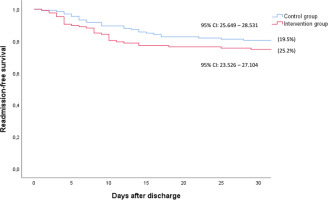当前位置:
X-MOL 学术
›
Int. J. Cardiol.
›
论文详情
Our official English website, www.x-mol.net, welcomes your
feedback! (Note: you will need to create a separate account there.)
Impact of telephone follow-up and 24/7 hotline on 30-day readmission rates following aortic valve replacement -A randomized controlled trial.
International Journal of Cardiology ( IF 3.2 ) Pub Date : 2019-07-30 , DOI: 10.1016/j.ijcard.2019.07.087 Stein Ove Danielsen 1 , Philip Moons 2 , Leiv Sandvik 3 , Marit Leegaard 4 , Svein Solheim 5 , Theis Tønnessen 6 , Irene Lie 7
International Journal of Cardiology ( IF 3.2 ) Pub Date : 2019-07-30 , DOI: 10.1016/j.ijcard.2019.07.087 Stein Ove Danielsen 1 , Philip Moons 2 , Leiv Sandvik 3 , Marit Leegaard 4 , Svein Solheim 5 , Theis Tønnessen 6 , Irene Lie 7
Affiliation

|
BACKGROUND
Thirty-day all-cause readmissions are high after aortic valve replacement (AVR). We aimed to assess the effectiveness of a structured telephone follow-up (TFU) and a 24/7 hotline on reducing 30-day all-cause readmission (30-DACR) after AVR, on reducing symptoms of anxiety and depression and on improving perceived health state.
METHODS
A prospective randomized controlled trial was conducted. Patients (n = 288) were randomly allocated to either post-discharge usual care or to care that provided TFU and access to a 24/7 hotline after AVR. Ancillary endpoints were time-to-event (readmission), proportion of avoidable versus unavoidable readmissions after AVR, and predictors of 30-DACR after AVR.
RESULTS
30-DACR was 22.3%. The structured TFU and 24/7 hotline intervention failed to reduce 30-DACR rates after AVR (P = 0.274). Symptoms of anxiety were significantly reduced 30 days after surgery (P = 0.031), an effect that did not persist one year after surgery (P = 0.108). Most readmissions occurred before 15 days post-discharge, and 75% of them were deemed to be unavoidable. Pleural drainage before hospital discharge (P = 0.027) and symptoms of anxiety before surgery (P = 0.003) were predictors of 30-DACR after AVR.
CONCLUSION
The TFU and 24/7 hotline had no effect on reducing 30-DACR after AVR. However, we did measure reduced symptoms of anxiety the first month after AVR. Anxiety reduction appeared to be an important target for intervention, because we found it to be a risk factor for readmission. Future research should focus on the effectiveness of interventions to prevent avoidable unplanned readmissions.
TRIAL REGISTRATION
ClinicalTrial.gov, NCT02522663.
中文翻译:

电话随访和24/7热线电话对主动脉瓣置换后30天再入院率的影响-一项随机对照试验。
背景技术主动脉瓣置换(AVR)后的三十天全因再入院率很高。我们旨在评估结构化电话随访(TFU)和24/7热线在减少AVR后30天全因再入院(30-DACR),减轻焦虑和抑郁症状以及改善感知方面的有效性。健康状态。方法进行了一项前瞻性随机对照试验。患者(n = 288)被随机分配到出院后的常规护理或提供TFU并在AVR后获得24/7热线服务的护理。辅助终点为事件发生时间(再入院),AVR后可避免与不可避免的再入院的比例,以及AVR后30-DACR的预测指标。结果30-DACR为22.3%。结构化的TFU和24/7热线干预未能在AVR后降低30-DACR率(P = 0.274)。手术后30天焦虑症状明显减轻(P = 0.031),这种效果在手术后一年没有持续(P = 0.108)。多数再入院是在出院后15天之前发生的,其中75%被认为是不可避免的。出院前的胸膜引流(P = 0.027)和手术前的焦虑症状(P = 0.003)是AVR后30-DACR的预测指标。结论TFU和24/7热线对降低AVR后降低30-DACR没有影响。但是,我们确实测量了AVR后第一个月焦虑症状的减轻。减少焦虑似乎是干预的重要目标,因为我们发现这是再次入院的危险因素。未来的研究应侧重于干预措施的有效性,以防止可避免的计划外再入院。试验注册ClinicalTrial.gov,NCT02522663。
更新日期:2020-01-11
中文翻译:

电话随访和24/7热线电话对主动脉瓣置换后30天再入院率的影响-一项随机对照试验。
背景技术主动脉瓣置换(AVR)后的三十天全因再入院率很高。我们旨在评估结构化电话随访(TFU)和24/7热线在减少AVR后30天全因再入院(30-DACR),减轻焦虑和抑郁症状以及改善感知方面的有效性。健康状态。方法进行了一项前瞻性随机对照试验。患者(n = 288)被随机分配到出院后的常规护理或提供TFU并在AVR后获得24/7热线服务的护理。辅助终点为事件发生时间(再入院),AVR后可避免与不可避免的再入院的比例,以及AVR后30-DACR的预测指标。结果30-DACR为22.3%。结构化的TFU和24/7热线干预未能在AVR后降低30-DACR率(P = 0.274)。手术后30天焦虑症状明显减轻(P = 0.031),这种效果在手术后一年没有持续(P = 0.108)。多数再入院是在出院后15天之前发生的,其中75%被认为是不可避免的。出院前的胸膜引流(P = 0.027)和手术前的焦虑症状(P = 0.003)是AVR后30-DACR的预测指标。结论TFU和24/7热线对降低AVR后降低30-DACR没有影响。但是,我们确实测量了AVR后第一个月焦虑症状的减轻。减少焦虑似乎是干预的重要目标,因为我们发现这是再次入院的危险因素。未来的研究应侧重于干预措施的有效性,以防止可避免的计划外再入院。试验注册ClinicalTrial.gov,NCT02522663。











































 京公网安备 11010802027423号
京公网安备 11010802027423号